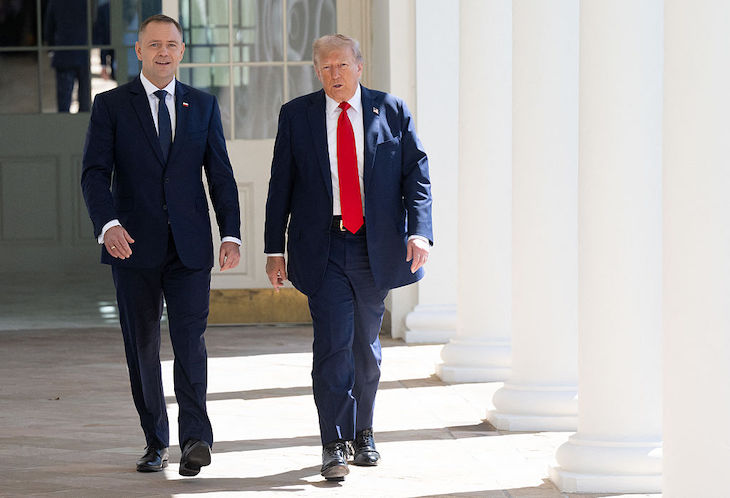Against the background of turbulent transatlantic relations, the visit this week of Poland’s new president, Karol Nawrocki, to Washington was deemed a success. US president Donald Trump affirmed continuation of US commitment to Poland’s security and invited Poland to join G20, in a testament to the country’s impressive economic record. Yet the trip also leaves a bitter aftertaste by exposing the depth of Poland’s political divisions. These splits are starting to affect Poland’s ability to throw around its weight on the global stage – precisely at a moment when Poland’s voice is more needed than ever.
The world is not standing still, waiting for Poland to sort out its affairs
Poland was noticeably absent from the collective visit by key European leaders and Ukrainian president Volodymyr Zelenskyy to Washington in the aftermath of Trump’s meeting with Russia’s Vladimir Putin. Since July 2024, Poland has not had an ambassador in the United States – in addition to dozens of other countries – as the Civic Platform (PO)-led government and the two consecutive presidents, both from the Law and Justice Party, (PiS) cannot agree on a suitable nominee.
The world is not standing still, waiting for Poland to sort out its affairs. Notwithstanding Nawrocki’s visit, the US administration is still reluctant to put real pressure on Russia even as Putin mocks Trump’s peace plans for Ukraine. Nato, meanwhile, seems to be holding together less by shared interests as than by excessive flattery of the US president by its secretary general, Mark Rutte.
When he was in power, Poland’s ex president, Andrzej Duda, did not hide his disagreements with the PO government. Yet, at important moments, he was also able to rise above them. In March last year, he and the prime minister, Donald Tusk, appeared jointly in the Oval Office. It was a display of unity that would be hard to imagine today.
If anything, Nawrocki enjoys even more goodwill within the MAGA movement. He visited the White House in May to snap a picture with Trump even before the first round of Poland’s presidential election. In June, the Secretary of Homeland Security Kristi Noem even travelled to Poland to endorse him ahead of the run-off.
Yet at this visit, Nawrocki walked into the Oval Office unaccompanied by any officials from Poland’s foreign ministry, an extraordinary departure from common practice. Poland’s chargé d’affaires in Washington, Bogdan Klich, was absent when Nawrocki arrived at Andrews Air Base – a fact that was then interpreted by some PiS supporters as a sign of a supposed boycott of the visit by the PO-controlled foreign ministry. The government, meanwhile, made a point of its distrust by issuing explicit negotiation guidelines for the president.
On Tuesday, the deputy prime minister and the foreign minister, Radosław Sikorski, flew to Miami for talks with the US Secretary of State. Such a parallel meeting is better than nothing – but it sends a far less compelling signal than a display of Polish unity in the Oval Office would have.
It is a sad sight to behold, particularly given the importance of Poland as a US ally and its potential as the natural leader of a European alliance of countries seeking to keep Russia at bay. Nawrocki recently vetoed a bill providing funding for Ukrainian refugees in Poland as well as Starlink’s service in Ukraine. It risked feeding an ugly undercurrent of anti-Ukrainian populism that played a role in his election.
Exploiting that sentiment might be good short-term politics. Yet one would like to see the Polish political class hold itself to a higher standard, reflecting the gravity of the historical moment facing the nation and the US-Polish alliance. Since 2022, Polish public support for Ukraine’s EU accession fell from 85 to just 35 per cent.
It isn’t just Nawrocki who bears responsibility for a gradual erosion of Polish support for Ukraine. The PO government indulged Polish famers protesting the imports of Ukrainian grain into the country. It also ruled out Polish participation in a possible military policing of the future ceasefire or peace along the frontline.
At a time when American politics, as well as US policy toward Europe, are becoming more chaotic and unpredictable, Poland should be a steady voice articulating their existential interests on the global stage. By far the most important among those are a defeat of Russia in Ukraine, and Ukraine’s European future. On that front, Nawrocki’s visit to Washington leaves a lot to be desired.







Comments